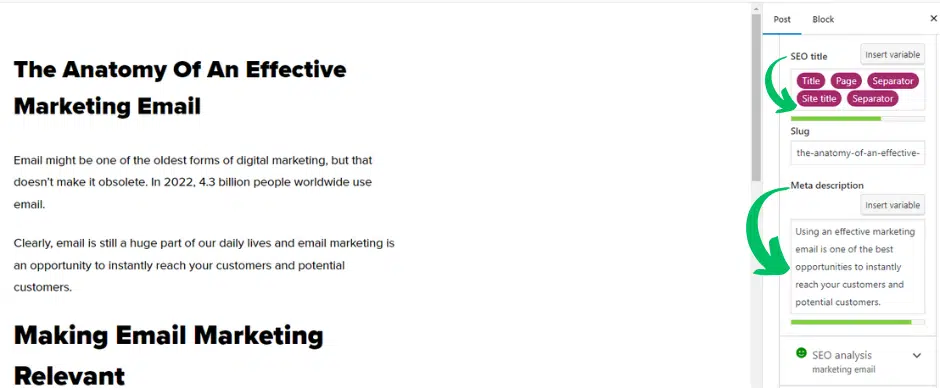7 SEO Tips To Improve Your Search Engine Ranking
SEO
 Posted by: Em Rohrer 12 months ago
Posted by: Em Rohrer 12 months ago
We all know Search Engine Optimization (SEO) is vital to making sure potential customers can find your website online, but it can feel overwhelming at times. There are a lot of tips and advice floating around out there about how to improve your search engine ranking, so where should you start?

On-Page vs. Off-Page SEO
Before I share some of the strategies and techniques we use to improve SEO for our digital marketing clients, let’s define these terms.
On-Page SEO
This term refers to anything you do on your website to try to improve its search engine ranking. This can include optimizing your site’s content to include targeted keywords, including relevant title tags and meta descriptions, optimizing your URLs, adding internal and external links, and more.
Off-Page SEO
This term refers to SEO tactics you put into place outside of your website with the goal of improving its search engine ranking.
This typically includes link building, content marketing, creating and maintaining social media accounts, getting more online reviews, and ensuring your citations are correct on other websites.
4 Ways To Improve On-Page SEO
Now that you understand the difference between these two types of SEO strategies, here are the most important things to address if you want to improve your on-page SEO.
1. Perform Keyword Research
Whether you’ve never done keyword research for your website or if it’s been a year or two since you’ve done it, this step is vital to the success of your website.
Using search data to research the best keyword targets for your business and industry is one of the best ways to make sure you have content on your website that matches what your target audience is looking for.
There are a variety of paid and free tools you can use to do keyword research. Some of my favorites to use are SEMRush, Moz, and WordStream.
2. Optimize Your Title Tags & Meta Data
This is something we do for all of our clients and it’s a huge part of what helps their websites show up in Google search results. Search engines read the title tag and meta data on every page of your website, so be sure to include your target keywords and relevant information.

3. Use Keywords In Header Tags
I keep coming back to keywords, but they’re important! Not only should you structure your website pages to include headers (H1, H2, H3, etc) to organize your content, but be sure to include your primary keyword for each page in the H1 header.
Using headers and subheadings correctly is one of the best ways to boost your search engine rankings. That’s because web crawlers used by search engines like Google view headers as having more weight than regular text.
4. Update Your Website Content Regularly
Content is still king when it comes to search engine ranking, which is why many of our clients hire us to write new, fresh content for their websites at least once (usually twice) a month.
Search engines like Google want to make sure that your website is still relevant to the people using Google to find information. The best way to do that is to regularly provide new content in the form of blog posts, page updates, etc.
Read One Of Our Client’s Most Recent Blog Posts
3 Ways To Improve On-Page SEO
Off-page SEO is an important part of improving your website’s search engine rankings. It may take a little more time than on-page SEO, but it’s just as important!
1. Manage Your Online Citations
Citations are simply anywhere your business is listed online. Every place your business is listed online should be the same, it should have your correct name, phone number, website, address, etc.
A great place to start is making sure you’ve claimed your Google Business Profile and if you have, make sure all the information is still correct.
You can also add weekly posts, photos, and additional information to your Google Business Profile that can help improve your local search engine rankings.
2. Actively Seek Online Reviews
The more positive reviews you get online, the more Google and other search engines will recognize that your business is reputable and worth showing in search engine results.
Need help getting more reviews? Check out our recommendations!
3. Engage In Social Media
Promoting your business, brand, and content on social media platforms helps attract a larger audience, which will drive more traffic to your website, which is an indicator to Google that your business is legitimate and ideal to recommend to potential customers.
Not every social media platform is the right fit for your business, so make sure you take some time to research which ones you should focus on.
Ready To Make SEO Stress-Free?
If you want to make sure your website is found by your ideal customers, we can help!
Click below to start a conversation and we can help set your website up for growth and success.
Categories:
About: Em Rohrer
You May Be Interested In:

Unlocking Engagement: Expert Tips for Hashtag Research
3 weeks ago by Grace May

Why SEO And Content Marketing Are Better Together
1 month ago by Grace May

Facebook Analytics: Understand Which Metrics Your Business Should Track
3 months ago by Em Rohrer

Why Content Is Still King: How To Refresh Your Website Content
4 months ago by Em Rohrer
Work with Us!
Need more help with: “7 SEO Tips To Improve Your Search Engine Ranking”? Let us know how we can help!
We want to be an integral part of your team to help with your digital marketing. Learn about our services or view examples of our work.

